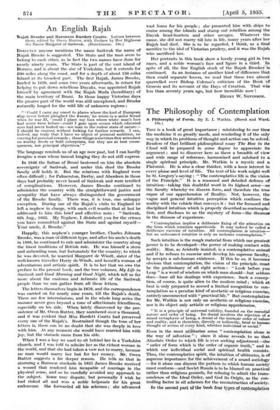An English Rajah Rajah Brooke and Baroness Burdett Coutts. Letters
between them, edited by Owen Rutter, with Preface by Her Highness the Ranee Margaret of Sarawak. (Hutchinson. 188.)
DIRECTLY anyone mentions the name Sarawak the name of Rajah Brooke is suggested. The State and the man seem to belong to each other, as in fact the two names have done for nearly ninety years. The State is part of the vast island of Borneo, and is about the size of Yorkshire, but it extends for 600 miles along the coast, and for a depth of about 150 miles Inland at its broadest part. The first Rajah, James Brooke, landed in 1839, and some two years afterwards, in return for helping to put down rebellious Dayaks, was appointed Rajah himself by agreement with the Rajah Muds (hereditary) of the main territory of Bruni. In those happy Victorian days the greater part of the world was still unexplored, and Brooke naturally longed for the wild life of unknown regions :
"'Could I carry my vessel to places where the keel of European ship never before ploughed the waters,' he wrote to a sailor friend when he was 35, could I plant my foot where white man's foot had never been before—could I gaze upon scenes which educated eyes had never looked on—see Mall" the rudest state of nature— I should be content without looking for further rewards. I can, indeed, say truly that I have no object of personal ambition, no craving for personal rewards ; these things sometimes flow attendant on worthy deeds or bold enterprises, but they are at best conse- quences, not principal objectives.'"
The language reminds us of an age now past, but I can hardly imagine a man whose inmost longing they do not still express.
In 1846 the Sultan of Bruni bestowed on him the absolute sovereignty of Sarawak, and under this deed the Brooke family still holds it. But the relations with P.ngland were often difficult ; for Palmerston, Derby, and Aberdeen in those days had probably never heard of Sarawak and were terrified of complications. However, James Brooke continued to administer the country with the straightforward justice and sympathy that have always distinguished the government of the Brooke family. There was, it is true, one unhappy exception. During one of the Rajah's visits to England he left a nephew in charge, with such evil results that at last he addressed to him this brief and effective note "Sarawak, 6th Aug., 1863. My Nephew, I disinherit you for the crimes you have committed against the State and against myself— Your uncle, J. Brooke."
Happily, this nephew's younger brother, Charles Johnson
Brooke, was a man of different type, and after his uncle's death in 1868, he continued to rule and administer the country along
the finest traditions of British rule. He was himself a stern and unbending man, but fortunately for the country, to which he was devoted, he married Margaret de Windt, sister of the well-known traveller Harry de Windt, and herself a woman of adventurous and artistic spirit. It is to her that we owe the
preface to the present book, and the two volumes, My Life in Sarawak. and Good Morning and Good Night, which tell us far more about the customs and intimate life of the Sarawak people than we can gather from all these letters.
The letters themselves begin in 1859, and the correspondence was carried on for nearly nine years, till the Rajah's death. There are few intermissions, and in the whole long series the manner never goes beyond a tone of affectionate friendliness, especially on his side. When lately discovered by the per- sistence of Mr. Owen Rutter, they numbered over a thousand, and it was evident that Miss Burdett Coutts had preserved every one of the Rajah's. Restrained though the tone of her letters is, there can be no doubt that she was deeply in love
with him. At any moment she would have married him with joy, but the obstacle came from his side.
When I was a boy we used to sit behind her in a Yorkshire church, and I was told to admire her as the richest woman in the world, and that she had taken a vow not to marry, because no man would marry her but for her money. Mr. Owen
Rutter suggests a far deeper reason. He tells us that in storming a Burmese stockade in 1825 James Brooke received a wound that rendered him incapable of marriage in the
physical sense, and so he carefully avoided any approach to the subject. Some may dispute, but personally I wish he had risked all and won a noble helpmate for his great endeavour. She forwarded all his schemes ; she advanced
vast loans for his people ; she presented him with ships to cruise among the islands and stamp out rebellion among the Dayak head-hunters and other savages. Whatever the mese, she did not marry till late in life, many years after her Rajah had died. She is to be regarded, I think, as a final sacrifice to the idol of Victorian prudery, and it was the Rajah who sacrificed her.
Her portraits in this book show a lovely young girl in two cases, and a noble woman's face and figure in a third. In spite of all, the fine English stock of the Rajah Brookes is continued. As an instance of another kind of difference that then could separate lovers, we read that these two almost quarrelled over Bishop Colenso's criticism of the Book of Genesis and its account of the Days of Creation. That was less than seventy years ago, but how incredible now !
HENRI' W. NEYINSON.










































 Previous page
Previous page